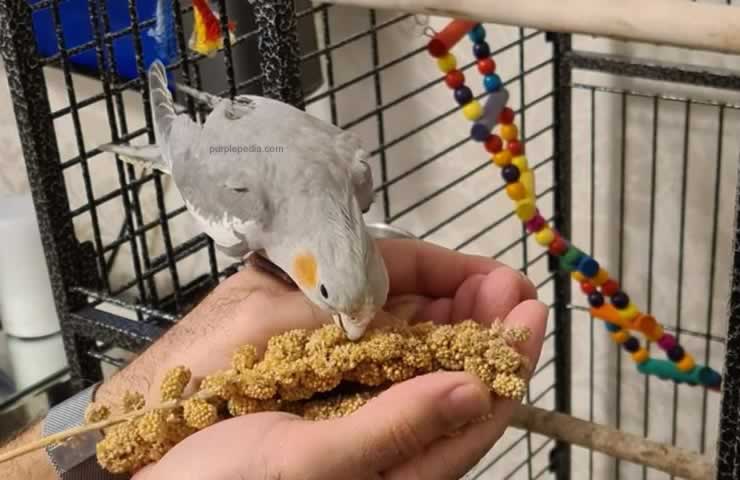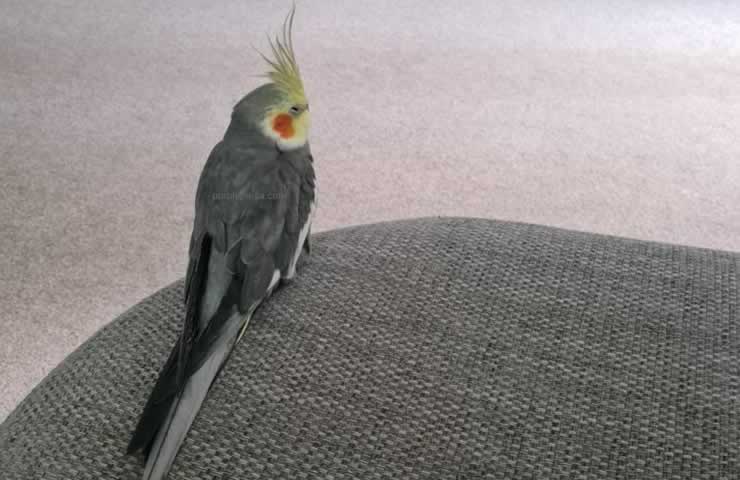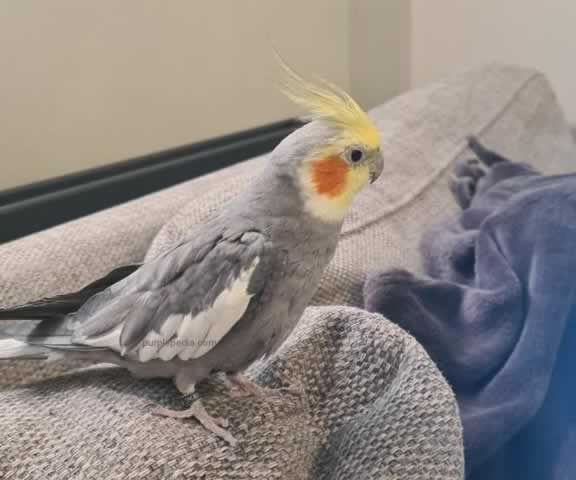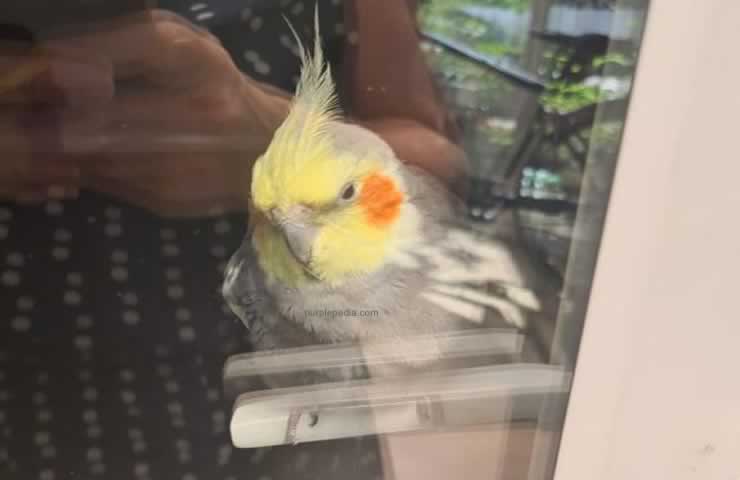Bird parents always want to keep more birds to grow their family, especially by experimenting with different species. As a parent, you would want to house them together and ensure that they co-exist peacefully. As we are about to find out, not all bird species are compatible, some are hostile, while some can go as far as murder.
So, what birds can be kept with cockatiels? You can keep cockatiels with similar-sized birds like the Bourke, lorikeets, princess, and Scarlet-chested parrots. These species have almost the same gentle personality as the cockatiels, enabling them to live amicably together. Although they can socialize, it is not advisable to let them stay in the same cage unless you are confident that they won’t be hostile to each other.
If you want to expand your bird family, you need to consider whether the birds are compatible. Therefore, we investigated which birds are compatible with cockatiels to give you all the ups and downsides involved.
Cockatiels are one of the most docile bird species and are famous for being social and easy. They thrive with members of their kind and a few from different species. Although they have no issues living with different birds, other species can be aggressive and defensive.

Various bird parents have successfully kept cockatiels with the princess, king, Bourke, lorikeets, and Scarlet-chested parrots. Any such pairing can get along, but bird experts advise against it due to the size differences. They also recommend letting them sleep in different cages and being vigilant in case of any signs of aggression.
You can gradually introduce them to each other as you monitor how they interact. This rule does not apply to every bird, as some will have conflicting personalities and keep clashing. For instance, cockatiels are incompatible with lovebirds, canaries, and finches.
The general rule is not to let different bird species live in the same cage unless you are sure that they will not attack each other, causing injuries or death. It is only with time that you can ascertain how they will get along.
Cockatiels love their space and they can fight if there is a threat to their territory. Therefore, it may take a while before they trust another bird enough to let it come close and share. The good news is, if you find birds with similar golden personalities, they can easily cohabit even when they are sworn enemies.

There are isolated cases of cockatiels getting along with canaries and budgies (especially the English budgies), but they don’t always stay in the same cage. It is typical for birds in the same enclosure to show a little aggression to each other, as it is their intuitive way of solving disputes.
You don’t have to be alarmed by this unless the bickering gets frequent or too aggressive. In such a case, it is imperative to separate them and find an alternative. Consider a large cage or individual cages and watch them keenly whenever they interact.
What To Consider When Housing Cockatiels With Other Birds
Usually, cockatiels are remarkable birds, able to get along with other species and live amicably, but it isn’t always the same for other birds. Luckily, you can manipulate some factors to ensure success in their cohabiting. Take a look at some factors to consider when keeping cockatiels with other birds.
Size
It is safe to entrust cockatiels to birds of the same size. If the other bird is enormous, it may bully it and easily succeed given these birds’ soft nature. Surprisingly, if the other is smaller, your cockatiel may be the villain and start dominating it because even the meekest animals tend to establish dominance over smaller birds.
It is recommended to place similar-sized birds together if they are of different species to ensure that none tries to bully the other, and none is too weak to be the victim. Notably, birds of the same size are friendlier to each other and have no issues with sharing. It is best to avoid large parrot species like the lovebirds because the cockatiels are no match to these feisty creatures.
Territory
You must have heard or read about how territorial birds can be. Cockatiels not only display this behavior in the wild but also when in captivity. Merely adding a new bird to the cage makes it feel threatened and insecure. If the birds feel cramped in a small place at any point, the fight for territory will begin. Birds can’t share a small space, especially if they are of different species.
The situation would be slightly better if the cage were larger, enabling both of them to go about their usual activities. To prevent this, it would help to have separate cages initially but have them facing each other. With this trick, they will gradually trust each other since they will be practically spending more time together. Eventually, it will be safe to house them together but in a larger cage.
Personality
Although having different species together doesn’t usually work, it can be successful if the birds are generally kind and social. Some birds are naturally aggressive even when they are from primarily gentle species, while some are polite but come from a family of hostile birds. The key is to find out more about the type of birds you want to keep together. If they are both loving and gentle, there is no problem keeping them together.

However, if one or both is a bully, it is best to keep them separately. First, learn about how aggressive they can get and what circumstances; this way, you will have a starting point. Moreover, birds can be jealous of their counterparts if they feel that your attention and affection are one-sided. Consequently, they may start chasing the other away to maintain your love. The only remedy in such cases is balancing out the time you spend with each of them to ensure none gets possessive of you.
Can Cockatiels Be Kept With Parakeets (Budgies)?
Budgies are small parrot species like the cockatiels. They are also friendly, and the chances are high that they will get along with other birds. We wish to find out whether they can accommodate cockatiels.
Cockatiels and parakeets (budgies) can mingle amicably in one cage provided that it is spacious and has all the resources they both need, but, if not, budgies tend to bully cockatiels. Although they are both quite friendly with each other, it is best to keep a close eye on them in case of any eventualities.
It is common for them to suddenly turn on each other during hormonal changes where they feel the need to be alone. If that is the case, you can quarantine the female for a while until she stabilizes, then put her back home.
Additionally, these birds don’t always share a diet. Therefore, it is better to learn what each bird prefers and have different foods at various spots inside the cage. Secondly, it would help ensure that the enclosure is large enough for both birds to feel comfortable.
Always be on the lookout for hostility signs like bruises or lack of appetite because your cockatiel may be suffering in silence. Given these occurrences, experts advise against keeping cockatiels and parakeets together as it is tasking and stressful.
To be sure, consider housing another cockatiel instead of mixing species unless it is necessary. Otherwise, you can give them time to bond gradually under your supervision and only let them stay together if you are confident that they will both be safe. You can also slowly introduce the parakeets to other birds while they are outside their cages for a while until they familiarize themselves.
Can Cockatiels Live With Lovebirds?
Lovebirds are known to be aggressive; therefore, it is wise to do more research if you are considering introducing them to your beloved cockatiel. If you have ever thought of housing cockatiels with lovebirds, let’s determine whether it is achievable.
Cockatiels and lovebirds cannot make good friends because they have opposite personalities. A lovebird would bully and try to defend its territory, unlike a cockatiel which is more calm and collected. It is not recommended to have them in the same enclosure or even let them mingle if you won’t always supervise them. For your cockatiel’s safety, it is best to avoid letting them face the hostile lovebirds.
Lovebirds are more territorial and would rather live alone than share their space with any other bird. Therefore, your cockatiel will frequently be on the receiving end of injuries, and, in some instances, it may die in the process.
Lovies have sharp and robust beaks that will pierce into another bird’s body without much struggle. They are also giant and more potent. Moreover, lovebirds mostly live in bonded pairs; hence introducing another bird won’t sit right.
Can a conure and cockatiel live together?
There are numerous birds one can keep in their home, including canaries, conures, cockatiels, and budgies, among many others. These pet birds have different needs, and most people choose to keep one species at a time. However, you might like to house two different parrot species, but you may wonder whether they can co-exist.
A conure and cockatiel can live together. However, for a conure and cockatiel to live together, you have to train them to tolerate each other. You have to slowly introduce them and keep them in separate cages for a while. You also have to supervise all their interactions because their friendliness might not last long. If your conure does not accept to live with a cockatiel, do not force them.
Conure lovers would love it if their different pet birds get along. It is beautiful to have different species of birds living in your house without any aggression. Therefore, before you take any action, read on to find out if conures and cockatiels can mate, if you can put budgies and conures together, if conures can live with lovebirds, and what birds can get along well with conures.
Can conures and cockatiels mate?
Most people keep pet birds for company and enjoyment, while others keep them for breeding purposes. Some pet birds are a result of crossbreeding; however, crossbreeding is not that simple. You need to understand how genetics work before deciding to cross-breed different birds.
Conures and cockatiels cannot mate; conures can only mate with other conures. Conures also require training to socialize with other birds. You will have to train your conure to mate with a cockatiel, which is a difficult task that might never happen.
Conures and cockatiels can live together when properly introduced but might not mate. Therefore, if you are housing a conure and a cockatiel and you find a few eggs in the aviary, remember that birds do not need to mate to lay eggs. A female conure or cockatiel can lay infertile eggs due to improper lighting in the aviary.
Crossbreeding occurs with birds of the same genus. All conures belong to either the Aratinga, Pyrrhura, Eupsittula, or Psittacara genus, while cockatiels belong to the Nymphicus genus. These birds belong to a genus that is too far apart for them to breed successfully.
There are advantages and disadvantages of crossbreeding pet birds. One advantage is passing on favorable traits to the next generation. Crossbreeding also promotes the survival of endangered species. The offspring will also share their parents’ traits and become more adaptive and live longer than their parents. Crossbreeding can also improve a bird’s immune system and reduce or eliminate certain diseases.
One disadvantage of crossbreeding is difficulty in predicting if the offspring will acquire the desired traits. The offspring might also gain the less desired traits resulting in a generation of birds with weak immune systems and bad genetic mutations. It can also lead to the disappearance of certain genes, and you cannot bring back lost genes.
Crossbreeding can also cause discomfort and depression in birds. Birds with undesired traits are denied the opportunity to interact and breed with other birds. Most pet birds are social animals and will become stressed if they cannot interact with other birds.
There is a fierce debate ongoing concerning ethics in crossbreeding. Some people support breeders hybridizing certain birds, while others do not support it. Those who do not support it argue that crossbreeding should occur naturally, ensuring the birds’ survival. Crossbreeding in captivity is done only to produce attractive pet birds but not preserve endangered birds’ lives.
What Other Pet Birds Do Conures Get Along With?
As a conure owner, you may want to keep other pet birds in your homes. However, before heading to the pet store to choose a bird, you have to know which birds are likely to get along with your conure.
A conure will get along with a finch and other subspecies of conures such as the Sun conure, the Jenday Conure, and the Green-Cheeked conure. Finches are popular small birds that people keep as pets because of their sounds and social interactions.
Conures will get along with finches if you provide the right environment. Therefore, you have to buy or build a large aviary to house your conures and finches. A small aviary could lead to fighting, which might not end well for your finches.

To assess if a bird will get along with your conure, you need to check their behavior. Focus on how the bird interacts with others. For example, is it active, territorial, or vocal? The bird should be active but not more active than the conure. If the bird is less active, your conure might get too aggressive and hurt it. The size of the bird also matters. Conures tend to get along with birds of the same size or smaller compared to bigger birds.
You have to supervise the interaction of your conure with the other birds. The birds might get along but change their attitude quickly. If possible, provide your birds with different sleeping areas where you can lock them whenever you leave.
Inspect your birds for injuries regularly and take them to the vet immediately if they get injured. If your conure suddenly becomes aggressive to the other bird, get a new aviary for the other bird before it is too late.
In Summary
The best way to keep cockatiels happy in a flock is by housing them with fellows of the same kind (as long as they are kind to each other). It is a huge gamble to let them stay in one cage with different species, especially a larger parrot. Therefore, we recommend carefully selecting gentle birds like Princess, King, Bourke, Lorikeets, and Scarlet-chested parrots to live together with your cockatiel.
The issue lies in keeping various bird species in one tiny enclosed space. In doing that, one or both birds will consider the other a territorial threat that needs to be eliminated or terminated. The only way to achieve this is by attacking the other, hoping to scare it. Such battles can be severe and, if extreme, can lead to death.
Conures and cockatiels can get along, but they cannot mate. The genetic pool of a conure and cockatiel are too far apart to successfully breed. However, you can breed a sun conure with a Jenday conure since they belong in the same genus.
Conures are big and aggressive birds; you need to find birds of their size and aggressiveness to get along. Budgies are too small and timid to be housed together with conures. Lovebirds are small birds but are very aggressive. Therefore, you need to keep them in pairs in their own aviary. Before introducing a new bird to your conure, make sure they can match your conure’s size and aggressiveness.
Therefore, we advise that you be patient with introducing the birds and learning more about their personalities first before letting them live together.
